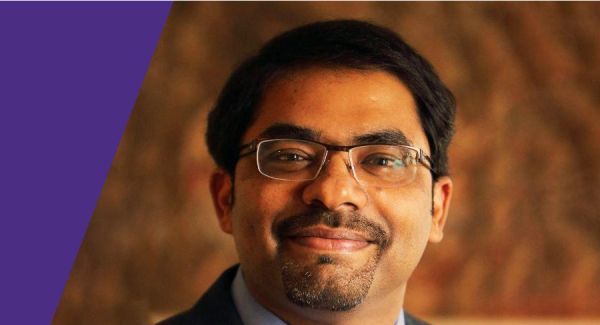
Power, Privilege, and Allyship: A ‘Double Agent's’ Perspective on the Effort to Deconstruct Colonialism in Global Health
Global health was born out of colonialism. Even today, it is neither diverse nor truly global. Every aspect of global health is dominated by those with power and privilege. If global health is be reimagined or decolonized, people and institutions who typically hold power and privilege must shift from saviorism to allyship.
On Tuesday, May 16, Professor Madhukar Pai, MD, PhD, a Canada Research Chair in Epidemiology & Global Health at McGill University in Montreal, Canada will visit the University of Washington as the Stephen Steward Gloyd Endowed Lecturer to give a talk titled Can We Walk Our Talk on Decolonizing Global Health?
Professor Madhukar Pai will discuss decolonizing global health and how practitioners in high-income settings can practice allyship to enhance equity in a highly inequitable field.
We talked to Professor Pai ahead of his May 16 lecture on his interest and motivations in global health and the efforts around decolonizing global health in the world today.
How and why did you become interested in the topic of global health inequities and decolonizing global health?
I was once called a 'double agent' because I grew up and trained in India, but now do global health research and teaching in Canada. I think it was meant as a compliment (I hope!) to suggest that someone like me understood global health from both perspectives.
As I have written elsewhere, double agents worry about being complicit in maintaining the power asymmetries inherent in global health. As a result, they often feel compelled to address power differentials in their lives as double agents. This may well be a strategy to resolve the conflicts in their lives, or an approach to dealing with guilt. Either way, over the past several years, I have seen very serious inequities within the field of global health, and the pandemic really opened my eyes to the devastating consequences of these inequities. So, I began openly commenting on this, and actively advocated for Covid-19 vaccine equity.
As an established academic in the Global North, I see myself as being very privileged, and I am looking for ways to spend my power and privilege and walk the path of allyship in global health.
Why is now the time to discuss the topic of decolonizing global health?
The Covid-19 pandemic, the Black Lives Matter movement, and the growing calls to decolonise and address reports of structural racism within humanitarian, development, international aid, and global health agencies are opening doors for uncomfortable but important conversations. They are revealing serious asymmetries of power and privilege that permeate all aspects of global health.
Global health is firmly centered on those with power and privilege, and focused on their generosity and saviorism. This saviorism or charity model is archaic, unfair, and unfit for purpose, as we’ve witnessed during the past 3 years. In a global crisis, we saw that rich nations chose to hoard millions of vaccines and let them expire, rather than donate in a timely manner and save lives. We also saw rich nations actively block the TRIPS waiver (a proposal to the World Trade Organization to waive intellectual property rights protection for technologies needed to prevent, contain, or treat COVID-19 “until widespread vaccination is in place globally, and the majority of the world’s population has developed immunity.”). The entire global health security and pandemic preparedness agenda is tightly controlled by high income nations and organizations based in the Global North.
For any meaningful change to happen, we need to challenge the dominant ways of centering global health on people and countries with the most power and privilege. It is time for people in the Global South to claim the seat they have historically been denied at the global health decision-making table. It is time to abandon the charity, saviorism model of global health, and demand for a model that is rooted in justice, equity, human rights, and self-determination.
As I have written elsewhere, we must not confuse initiatives such as diversity, equity and inclusion (DEI) with decolonization. Also, most organizations are still talking about decolonization and DEI without any meaningful structural changes to shift power.
How should universities change the way they teach global health, in light of the above inequities you describe? Have you changed the way you teach global health at your university?
During the pandemic, I made major changes in how I teach global health. In a recent article, I worked with several global health teachers to suggest how we can use Covid-19 as a teachable moment and use it to focus on equity and human rights as a central theme in global health. We suggested that global health courses must cover the importance of understanding racism and white supremacy in global health, and include content on power, privilege, anti-oppression, anti-racism and allyship. We also recommend including content on coloniality in global health and the persistent power asymmetries that affect every aspect of global health. Global health simply cannot be taught as an apolitical field.
We believe that global health courses must center on Black, Indigenous and people of color (BIPOC) speakers, especially experts from the Global South, Indigenous scholars, and individuals working and living within their impacted communities. They elevate our courses with their authenticity, credibility and lived experience. I now routinely apply the above ideas to my global health course at McGill University. It has made a massive difference. I cannot see myself going back to how I was teaching before the pandemic.
What recent articles by you would you suggest to students studying or working in the field of global health?
I would suggest the following articles for further reading:
- How we classify countries and people—and why it matters
- From vaccine to visa apartheid, how anti-Blackness persists in global health
- Will global health survive its decolonisation?